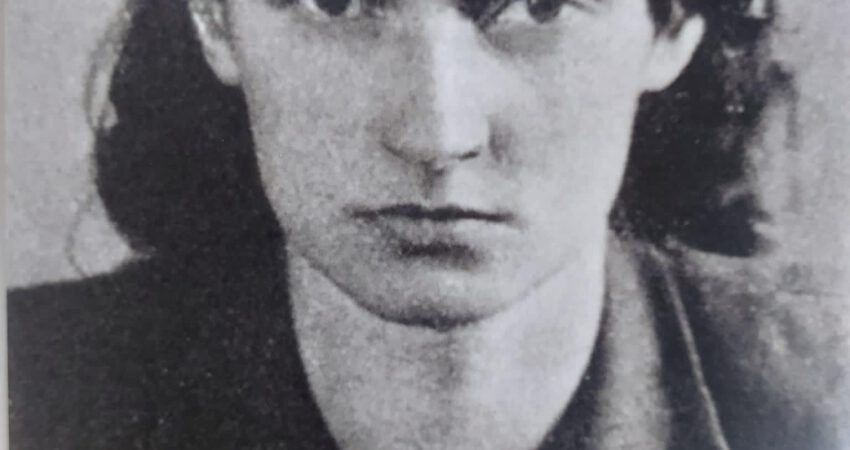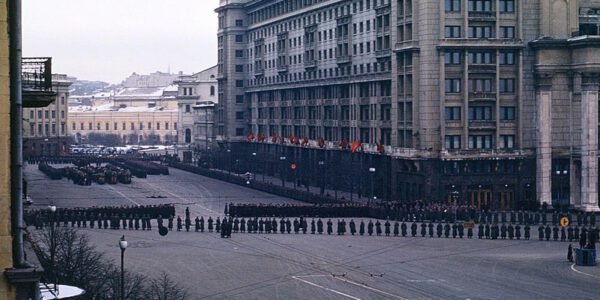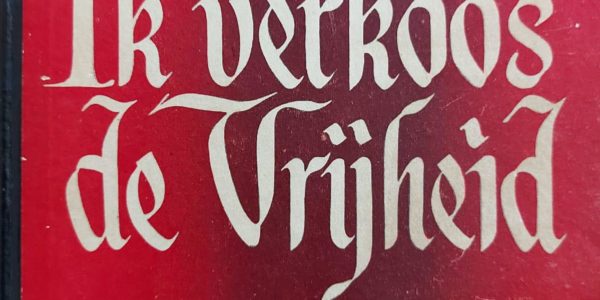Book review: Barbara Skarga, ‘’After the liberation. Notes on the Gulag’’, 1944-1956 (Amsterdam, 2022) ISBN 9789403107226; 432 pp., €34.99 by Patrick van Schie
In May, the Netherlands and Europe invariably look back at the end of the Second World War. First the stories about the horrors of the time under National Socialism, followed by the joy of the liberation in 1945: on May 5 in (all of) the Netherlands, the day of the German capitulation in Wageningen, on May 8 throughout Europe, Victory in Europe (VE) day.
When liberation comes to mind, everyone in Western Europe thinks of celebrating crowds, and of the restoration of civil liberties and democracy. In the former satellite states of Central and Eastern Europe, “liberation” has a very different connotation: first the soldiers of the Red Army started countless rapes and looting, then the repression by the Soviet Union followed and its communist puppets who were in power much longer than the German occupation period and which was at least as cruel.
Barbara Skarga is a twentieth-century philosopher famous in her own country, in Poland. A translation into Dutch was recently published of one of her books, not of a philosophical work but of her memories of the post-war era. That time brought her not freedom but twelve years of imprisonment: first in a prison in Vilnius (Lithuania), then ten years in various camps of the Gulag (those were concentration camps in the Soviet Union), and after her ‘release’ from there again, forced to stay for a year and a half in a kolkhoz (a collectivized farm) in the far east of Siberia. It is a chilling account of how inhumane Russian communism worked out in practice.
Skarga’s “crime”: member of the non-communist resistance against the Germans
Barbara Skarga was punished for not being a member of the (minuscule) communist resistance against the German occupiers, but of the large, non-communist Polish-nationalist AK. The Soviet Union labeled this as ‘fascist’, although the AK fought fiercely against the German occupiers already when the Soviet Union was still an ally of Hitler’s Germany (which lasted until June 22, 1941). It is a tactic that Putin is still applying to everything that stands in the way of his regime, such as now the Ukrainians who resist the Russian invasion of their country. She was also told to be “unpatriotic” because she did not like the Soviet Union, although Poland was her homeland, and not that country.
After her arrest, Skarga ended up in a small overcrowded cell in Vilnius with many other women who had been arrested for all kinds of ‘offences’. She talks about the strict prison regime, about the total lack of privacy (even when the needs had to be relieved) and basic hygiene and all the other suffering that came with it. Some women were beaten to force them into (completely fabricated) confessions. But the most commonly used torture method was sleep deprivation. All incarcerated women suffered from this anyway because the cell was so full that you had to lie against the sweaty bodies of fellow prisoners, but also because the bright lights in the cell never went out. There were no beds or blankets, people lay on the cold, damp and extremely hard ground or on wooden cots without a mattress and without blankets or anything that looked like it.
Some women were also taken out of the cell on successive nights to be interrogated. They could then not sleep for 4 or 5 days in a row, which, in addition to hallucinations, for example, resulted in people often wanting to accept everything (to alleged ‘offenses’) just to get some sleep. Incidentally, people in Vilnius were still ‘lucky’, writes Skarga, that there was a shortage of NKVD agents [the NKVD was the forerunner of the KGB]. As a result, there were sometimes only two NKVD agents available for interrogation per prisoner, unlike in Moscow where there were 4 or 5 agents to interrogate (read intimidate and threaten) a prisoner. The two, who could hardly replace each other, sometimes fell asleep themselves, which then made it possible for a prisoner to fall asleep for an hour. That one hour after days without sleep almost felt like one could catch up on a night’s sleep.
Stay in the Gulag
Sooner or later the conviction came, of course without due process. The verdict was also predetermined; the judges read out the “penalty” drafted in Moscow. Because of her membership in the AK, Skarga was sentenced to ten years of hard labor in the Gulag, the extensive system of penal camps in the Soviet Union. She has seen a number of them in those ten years, one of which was located in the scorching hot (but also freezing cold at night) Kazakhstan in the deserted steppe, and most of them in Siberia, where twenty degrees of frost was considered ‘mild’ but that in the summer was infested with mosquitoes.
Skarga describes it all sharply and penetratingly. Her notes, made in the early 1980s, are not reading material for the faint-hearted, but they do indicate how hard and how horrific life in the gulag was. That stay in the gulag followed or was interrupted by an equally degrading transport in cattle trucks, again full of packed prisoners who were in complete uncertainty about what awaited them next.
Skarga tells about her own experiences and suffering, as well as about her observations and regularly about the stories of other prisoners, especially those of a few who did not survive. And there were many, because once weakened – due to illnesses, too hard work for 11 hours a day in the bitter cold (that does not include the time to get from the camp to the workplace and back) and very bad food with much too few calories – often ended up in an unreversible spiral downwards, to death. Incidentally, such a person was not entered in the system as deceased, but as ‘departed’.
If you want to know more (horrible) details, read the book. An indication of the hell that formed the gulag is Skarga’s account from the time she worked in an infirmary of one of the camps. The infirmary was perceived by the prisoners as a ‘paradise’, not because there were skilled doctors (there were few of them) or the right medicines (there were none either), but because there were beds in which the sick could lie alone and because there were prisoners appointed as nurses who even occasionally showed a kind word or gesture, which was completely absent in the rest of the camp. The infirmary was so popular that prisoners inflicted serious injuries on themselves, preferably those that resulted in an ulcer because you then automatically got high fevers, actually the only reason that gave an exemption (for a while) from heavy work. The fact that people regularly became so seriously weakened that death followed a few weeks later was a risk that these prisoners were only too happy to accept. And it was not an individual who acted like this, this was commonplace.
The crime of independent thinking
Skarga’s description of “existence” – for she does not want to call the twilight state between freedom and death life – in prison, in the Gulag and in the Siberian kolkhoze – gives a good insight into the reality of “real existing socialism” as communists themselves used to refer to their system. She also noticed how different the mentality of the Russians – prisoners, camp guards and later the ordinary Russians she meets in the kolkhoze – are from those who come from countries that have been part of European culture: Balts, Poles, et cetera. The Russians are servile everywhere. They do not ask, they do not show any resistance; for the party to indicate that something must be so and so is enough for them.
More than once, Skarga asked a Russian what he or she thought of something. The answer was almost automatic: “It is difficult to say, nothing has yet been written about this question in Pravda [the Party newspaper in the Soviet Union].” The Russians gave no sign of their own thoughts.
Skarga writes: “One of my interrogators once told me, “Madam, you think independently. For that reason alone you should be under lock and key.” Skarga also gives striking descriptions of the communist system in various passages. I will close with one of them. Communism is a “monstrous mechanism … that broke every human being who could not, was unable, or was unwilling to polish the edges of his own being to fit into the system anyway. It is true that that machinery broke everyone, those who were part of it and those who opposed it, the free as well as the captive. Bodies and, even worse, characters were broken. The imagination was paralyzed, ideas were stifled, brains were flushed. People lost their sense of dignity and inner freedom. People had to learn to think in preconceived formulas and changed into uniformed puppets.”




Follow Us!